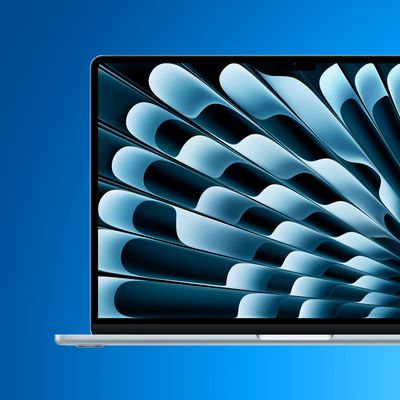Apple Backpedals, Puts "All Eligible Products" Back on EPEAT Environmental Registry
Last week, Apple notified the Electronic Product Environmental Assessment Tool (EPEAT) that it was withdrawing its products from the EPEAT registry, and would no longer be submitting its products for evaluation. EPEAT measures the environmental impact of electronics and is used by many corporations and governmental organizations as a yardstick on enterprise purchases.
In one well-publicized instance, the city of San Francisco said it would no longer purchase Macs without EPEAT certification.

In an unusual about-face, Senior Vice President of Hardware Engineering Bob Mansfield wrote an open letter reversing the decision to remove Apple products from the EPEAT registry.
We’ve recently heard from many loyal Apple customers who were disappointed to learn that we had removed our products from the EPEAT rating system. I recognize that this was a mistake. Starting today, all eligible Apple products are back on EPEAT.
It’s important to know that our commitment to protecting the environment has never changed, and today it is as strong as ever. Apple makes the most environmentally responsible products in our industry.
We've received word that Bob Mansfield is sending a copy of the letter, from his @Apple.com email address, to customers who had expressed concern over the EPEAT withdrawal.
A full list of Apple's EPEAT-rated products is available, and includes the latest releases of the MacBook Air and the MacBook Pro with Retina Display.
EPEAT CEO Robert Frisbee also wrote a letter confirming Apple and EPEAT's commitment to working together and hinting at future changes to the EPEAT judging process to work with Apple as it continues its cutting edge computer designs.
We look forward to Apple’s strong and creative thoughts on ongoing standards development. The outcome must reward new directions for both design and sustainability, simultaneously supporting the environment and the market for all manufacturers’ elegant and high-performance products.
An interesting question for EPEAT is how to reward innovations that are not yet envisioned with standards that are fixed at a point in time. Diverse goals, optional points awarded for innovations not yet described, and flexibility within specified parameters to make this happen are all on the table in EPEAT stakeholder discussions. And of course, timely standards development, as with newly created Imaging Equipment and Television standards, and the current refresh of the PC/Display standard, is critical as well.
Slate's Farhad Manjoo called the entire EPEAT situation a "really strange unforced error."
Popular Stories
Apple is not expected to release a standard iPhone 18 model this year, according to a growing number of reports that suggest the company is planning a significant change to its long-standing annual iPhone launch cycle.
Despite the immense success of the iPhone 17 in 2025, the iPhone 18 is not expected to arrive until the spring of 2027, leaving the iPhone 17 in the lineup as the latest...
Language learning app Duolingo has apparently been using the iPhone's Live Activity feature to display ads on the Lock Screen and the Dynamic Island, which violates Apple's design guidelines.
According to multiple reports on Reddit, the Duolingo app has been displaying an ad for a "Super offer," which is Duolingo's paid subscription option.
Apple's guidelines for Live Activity state that...
Apple is planning to release a low-cost MacBook in 2026, which will apparently compete with more affordable Chromebooks and Windows PCs. Apple's most affordable Mac right now is the $999 MacBook Air, and the upcoming low-cost MacBook is expected to be cheaper. Here's what we know about the low-cost MacBook so far.
Size
Rumors suggest the low-cost MacBook will have a display that's around 13 ...
Govee today introduced three new HomeKit-compatible lighting products, including the Govee Floor Lamp 3, the Govee Ceiling Light Ultra, and the Govee Sky Ceiling Light.
The Govee Floor Lamp 3 is the successor to the Floor Lamp 2, and it offers Matter integration with the option to connect to HomeKit. The Floor Lamp 3 offers an upgraded LuminBlend+ lighting system that can reproduce 281...
Now that the calendar has flipped over into January, steep discounts on popular Apple products have become more rare after the holidays. However, if you didn't get a new pair of AirPods recently and are looking for a model on sale, Amazon does have a few solid second-best prices this week.
Note: MacRumors is an affiliate partner with some of these vendors. When you click a link and make a...
Belkin today announced a range of new charging and connectivity accessories at CES 2026, expanding its portfolio of products aimed at Apple device users.
UltraCharge Pro Power Bank 10K with Magnetic Ring
The lineup includes new Qi2 and Qi2.2 wireless chargers, magnetic power banks, a high-capacity laptop battery, and USB-C productivity accessories, with an emphasis on higher charging...
Apple plans to introduce a 12.9-inch MacBook in spring 2026, according to TrendForce.
In a press release this week, the Taiwanese research firm said this MacBook will be aimed at the entry-level to mid-range market, with "competitive pricing."
TrendForce did not share any further details about this MacBook, but the information that it shared lines up with several rumors about a more...
With the release of iPadOS 26.2 and macOS Tahoe 26.2, Apple has improved the Wi-Fi speeds for select Macs and iPads that support Wi-Fi 6E. Updated Wi-Fi connectivity specifications are listed in Apple's platform deployment guide.
The M4 iPad Pro models, M3 iPad Air models, A17 Pro iPad mini, M2 to M5 MacBook Pro models, M2, M3, and M4 MacBook Air models, and other Wi-Fi 6E Macs and iPads now ...
























